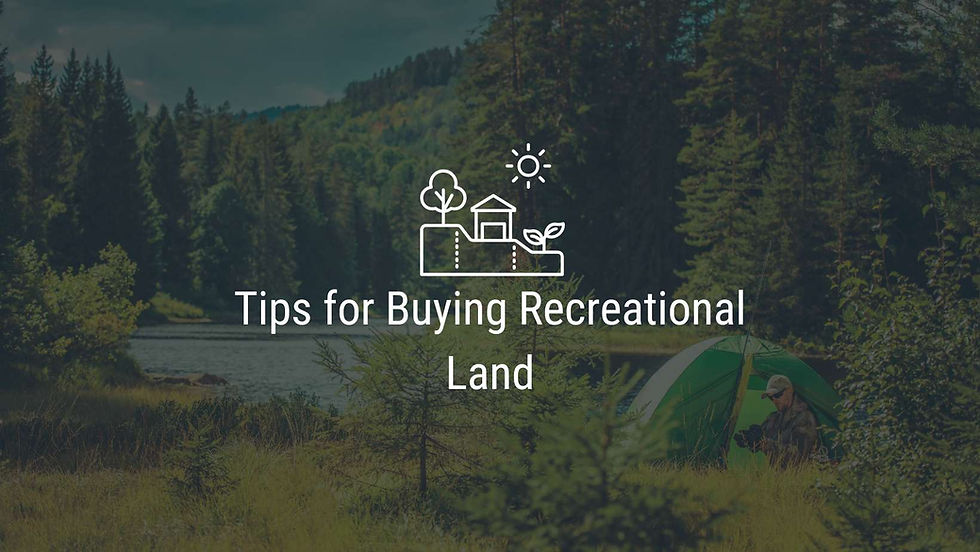
Purchasing recreational land can be a game-changer. It’s not just about owning property; it’s an investment opportunity that brings unique benefits. Owning recreational land is an asset that grows over time, much like other residential properties or stocks might do – only with added perks. Not many investments allow you to enjoy nature while appreciating in value like recreational land does! You can also make money by leasing your property for recreational activities. Purchasing recreational land is an exciting venture, but there are a few crucial factors to consider before you make a purchase.
Evaluate Proximity to Utilities
When considering the purchase of recreational land, evaluating the proximity to utilities is essential. Access to water, electricity, telephone service, and sewage systems can significantly impact your enjoyment and current and future usage of the property.
If you want a property that has utilities but they are not readily available on or near the property, installation can be costly and time-consuming. It's crucial to research and understand these aspects beforehand to avoid any unforeseen expenses or complications. Contacting local utility companies for estimates and information can provide clarity on what to expect. Additionally, considering alternative solutions, such as solar power, may be beneficial for more remote properties.
Consider Accessibility
When evaluating a property's location, consider its accessibility and the commute needed to reach it. A long distance from your home to your property significantly increases the time commitment required, diminishing the value of your investment if frequent use is not feasible. On the other hand, property located near your primary residence may lack the appeal to justify the purchase and exploration.
Additionally, if a property does not have access roads on it, you may have difficulty using it to its full potential. While roads can be added, having roads from the start can make using your land much more enjoyable. If a property does not have roads and you'd like to add them, this is another budget item that will need to be considered. Similarly, there are some cases where land doesn’t come with direct legal access. In these cases, you may have to rely on an easement. It’s important to make sure you are fully aware of the access situation before you purchase recreational land.
Determine Your Budget
Purchasing recreational land is a big investment, and your financial situation will determine whether the land is a wise investment that will serve you well long-term. Your budget plays a crucial role in determining both the quality and size of the land you can purchase.The cost of land varies significantly depending on its location; plots near populated areas tend to command higher prices compared to those in more secluded regions. This necessitates a careful assessment of your priorities — whether you prefer investing in remote land to benefit from privacy and potentially lower costs, despite the longer travel times, or if you're willing to allocate additional funds for the convenience of land closer to urban centers.
Buying recreational land often requires a large down payment and possibly shorter loan amortization periods, leading to higher monthly payments. It's essential to evaluate your financial capacity early in the decision-making process to understand what you can realistically afford while accounting for ongoing expenses, such as property taxes. If the path forward seems unclear, seeking advice from financial advisors and lenders can provide clarity. Lenders can offer a precise figure on the loan amount you're eligible for, while financial advisors tailor their guidance to fit your specific situation and objectives, ensuring your land purchase aligns with your long-term financial goals.
Understand Your Purpose for the Land
The primary factor to keep in mind when purchasing recreational land is your intended use for the property. For example, if you'd like to hunt on the land, you will need to make sure that the hunting land is large enough and that the wildlife that you wish to hunt is present on the land. Similarly, if you'd like to use the property for hiking and camping, you will need to focus on ease of access and nature to enjoy.
Long-term plans can greatly impact your land choices. While your short-term situation may be relatively simple to break down, your long-term plans for the land can be much more challenging to analyze and define. For instance, if you intend on building a home on the land in the future, it's crucial to verify the site's construction viability. Truck accessibility is a key factor for construction projects, along with the availability of essential utilities. Electrical connections are not only desired but often mandatory for residential areas. While water and sewer connections are beneficial, they are not indispensable; a septic system and a well can serve as viable alternatives if the terrain is appropriate. However, some properties may be inherently unsuitable for construction if they lie within protected regions or are zoned for different purposes.
Work With a Real Estate Agent
Recreational land purchases can be complicated, and working with a real estate agent can help. A knowledgeable realtor that is familiar with recreational land purchases will understand the nuances of land properties and help ensure your investment meets your expectations. They can provide insights into potential issues like zoning laws, terrain complications, and legal access points that may not be apparent to the untrained eye.
How to Find Recreational Land for Sale
There are many ways to find recreational land for sale that fits your buy criteria. Online listing marketplaces, such as LandGate, can help. Viewing listings and property owner contact information on LandGate's marketplace is free, and each listing is enhanced with unique property data to help you find the perfect property: